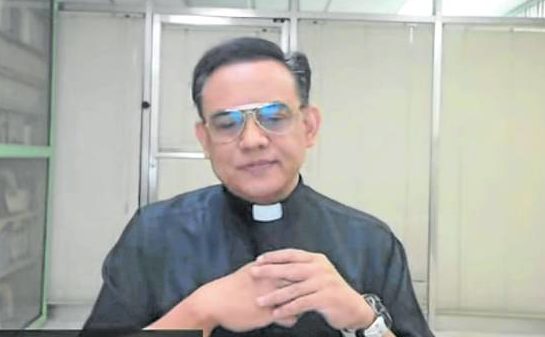
Fr. Jose Francisco “Jocis” Syquia
MANILA, Philippines — “The devil always appears as an angel of light to those who know no better.”
Fr. Jose Francisco “Jocis” Syquia wrote this line in his 2006 book “Exorcism: Encounters with the Paranormal and the Occult” in recalling the cases he had handled or documented as chief exorcist of the Archdiocese of Manila.
Sixteen years later, in a recent forum organized by the Catholic Church, Syquia again spoke warningly of the use of deception, this time not only in demonic possessions and hauntings but also in the most modern and pervasive, if not addictive, of today’s conveniences: the internet.
“Technology has advanced faster than morality, so much so that Pope Benedict XVI tells us that not everything that is technologically possible is ethically permissible,” said Syquia, who was the main speaker at the online conference “In Defense of Truth” held Oct. 5.
Effects clear to see
In Benedict’s book “Spe Salvi,” he said, the now retired Pontiff saw how “certain forms of technological innovation can open up appealing possibilities for evil that formerly did not exist.”
“The virtual world created by technology… promises redemption without a need for God, [and a world] where one can find fulfillment and spirituality without needing God,” Syquia said.
“And you see the effects very clearly now. You see how people become so rude, have lost empathy, have lost understanding of the other person’s situation, and are easily angered or triggered by anger. There is a psychological principle attached to this reality,” added the priest, who is also a psychologist.
The Church, he conceded, still has to understand and “has penetrated only superficially… this parallel virtual universe” where “enemies of the soul” now reside.
He identified some of the telltale signs of how such enemies are taking hold, especially of the youth.
Instead of having richer, personal interaction with their family or community, young people are spending more time with their gadgets. “If you leave a child in the room with his or her gadget for a few weeks, you will little by little see a change in his or her way of thinking, feeling and behaving.”
“During the 1970s and 1980s, after you read the newspaper in the morning, you go on with your life. Now you see people constantly scrolling and checking news, news that are updated regularly so people can keep looking at their phones,” he recalled. “Time is all we have and now technology is stealing it from us.”
This precious time tends to be spent in a “filtered world,” he said, where “new standards of human dignity… can only be fulfilled by materialism and consumerism. Self-worth is now tied to the virtual world and its standards, not anymore with God.”
Psychological effects
He cited two main psychological effects of internet addiction: “online disinhibition” or the tendency of a person to be meaner and more aggressive and rude online than in person; and “negativity bias” or the tendency to focus on something that is outrageous or negative.
“In face-to-face encounters, if you say something mean or rude, immediately you see an effect and it brings about an empathy or sympathy from your emotions. Online, there is no eye contact and (only) a big distance between people, so you tend to dehumanize and depersonalize a person,” he said.
It’s no wonder, he noted, that the rise of mental health issues coincided with the rise of gadgets and social media.
Lastly, he said, the devil has made modern culture “highly sexualized,” to the point that the Church now regards online pornography as “an epidemic of biblical proportions.”
He cited studies that found that 50 percent of all internet searches are pornographic in nature.
‘Parasitic on the good’
One of the forum panelists, Mary Erika Bolanos, a lay preacher and assistant principal of the University of Santo Tomas (UST) Senior High School, said Syquia’s observations “confirmed the reality of diabolical evil in our midst, not least through various portrayals in people’s favorite pastime: the media.”
Also speaking at the forum, Fr. Rodel Aligan, dean of the UST Ecclesiastical Faculties, expounded on Syquia’s take on how confusion and lies can now be easily sown online.
“Evil is parasitic on the good and must survive by twisting things that are good in themselves,” Aligan said. “By telling us fragments of truth at the wrong moment, the devil can confuse us greatly, even influencing us to turn away from what our souls need.”
The first “In Defense of Truth” conference was organized by the Federation of Asian Bishops’ Conferences-Office of Social Communication, Veritas Asia Institute of Social Communication, Catholic Media Network-Philippines and Mary the Queen Parish in the Diocese of Novaliches.